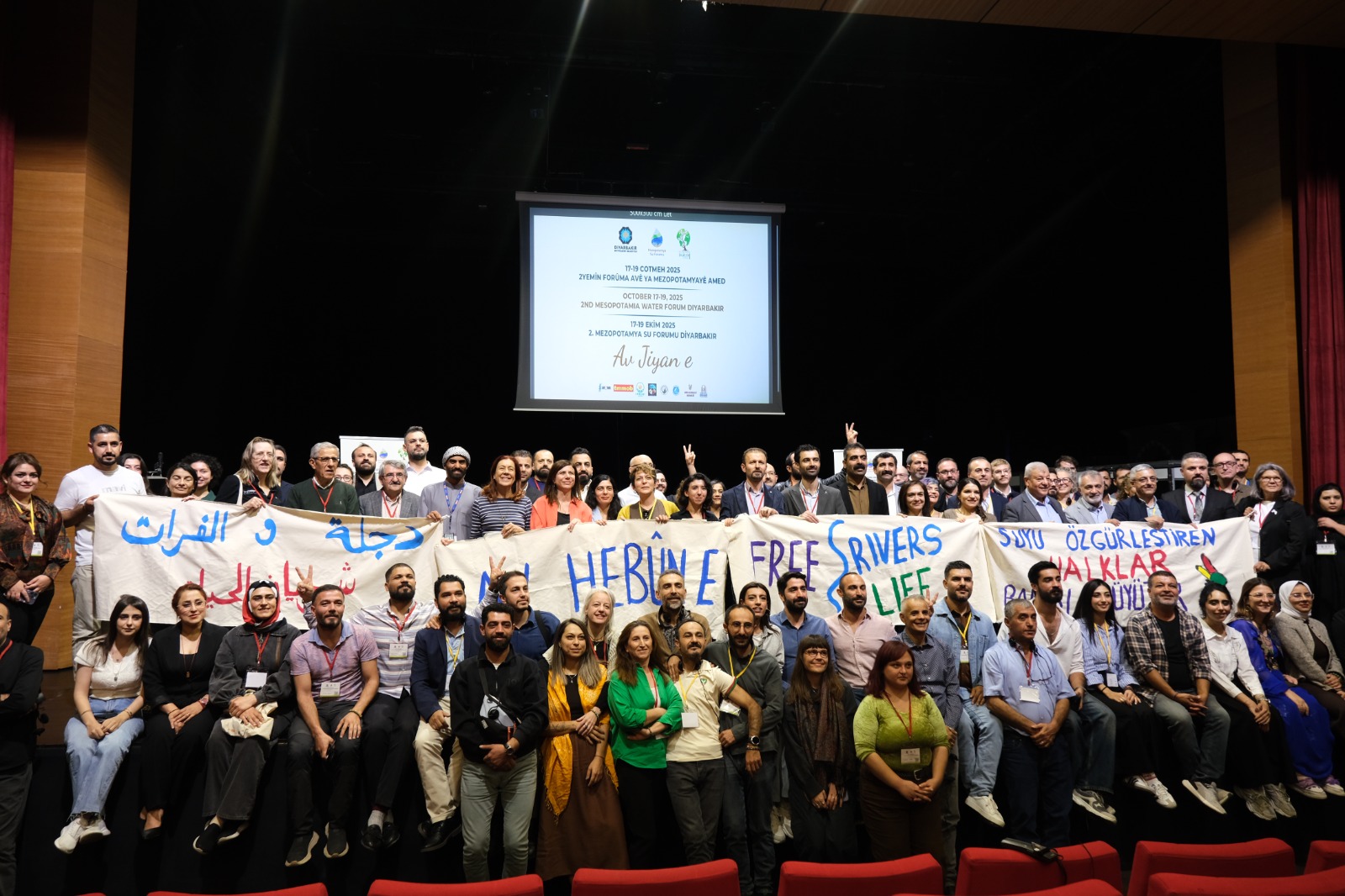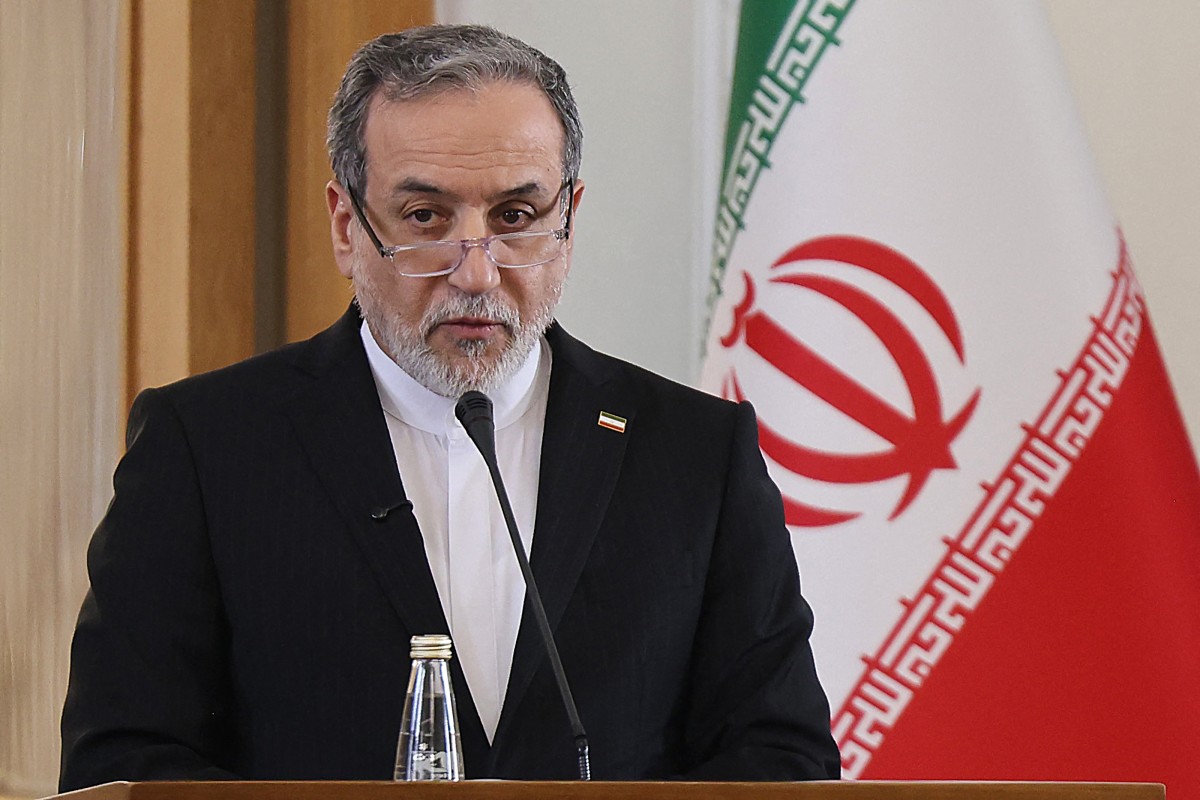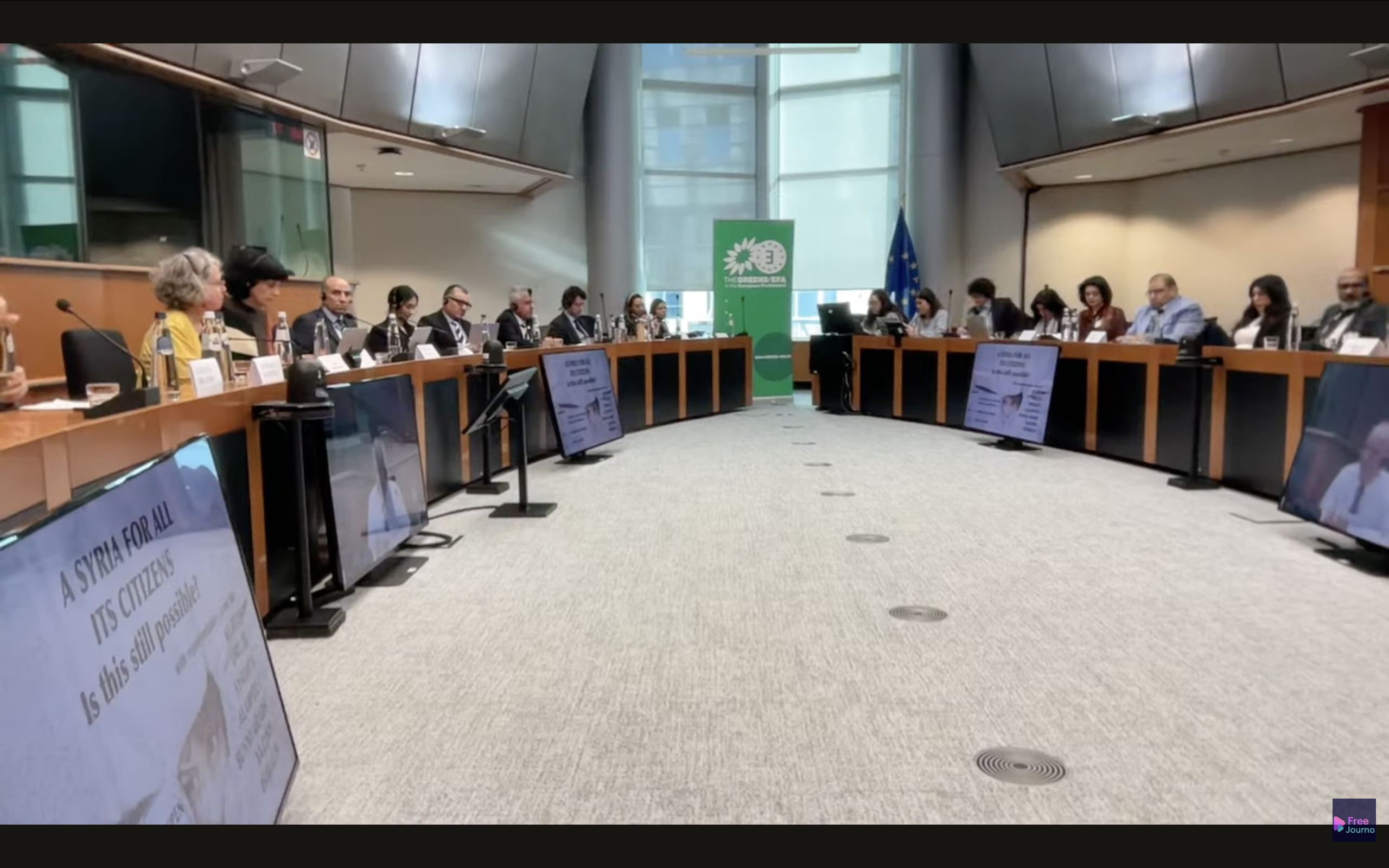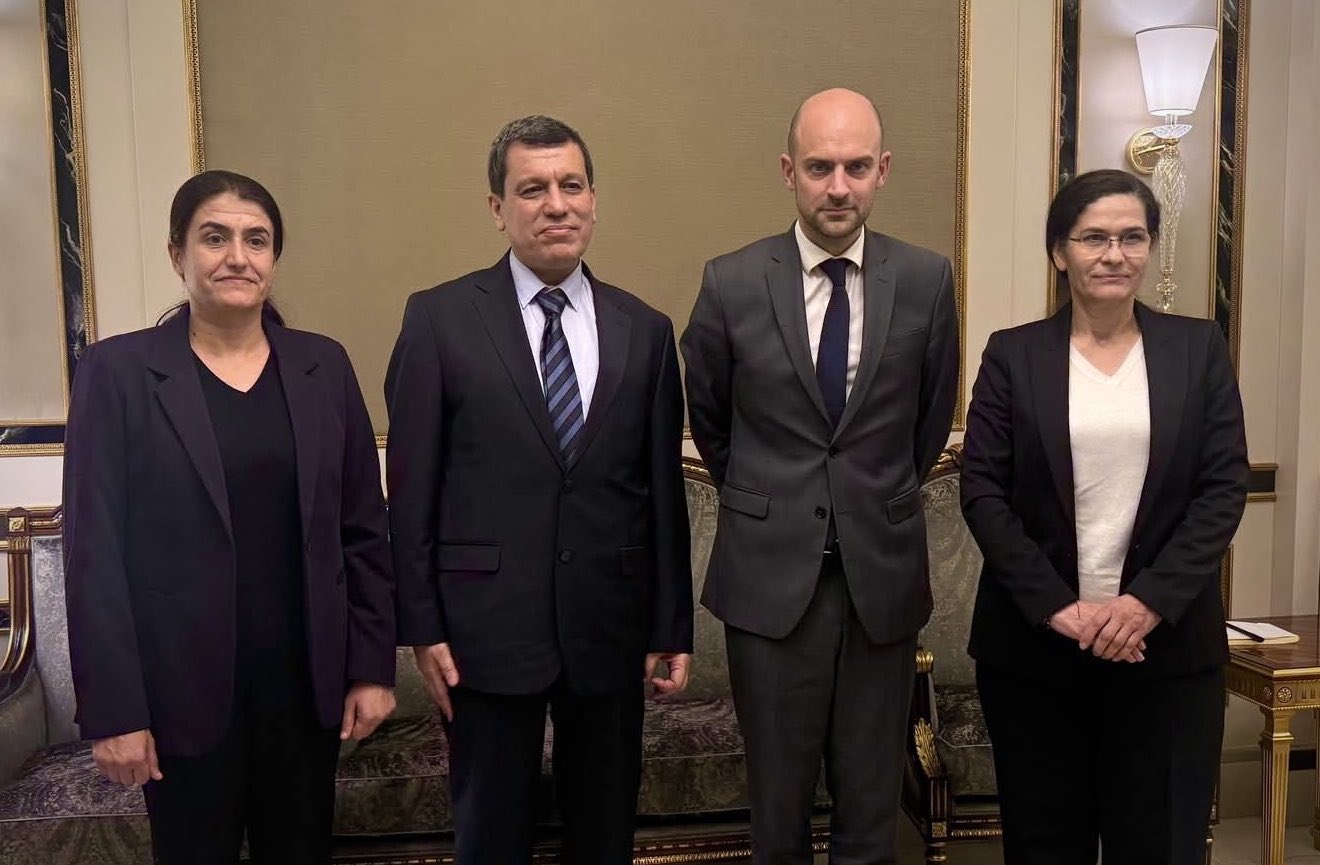After the Mesopotamia Water Forum: The Freedom of Rivers, The Peace of Peoples
The second Mesopotamia Water Forum, held in Amed (Diyarbakır) on 17-19 October, approached the water crisis not merely as an environmental issue but also as a matter of regional peace, justice, and diplomacy. During the forum, participants emphasized that regional states have turned water into a tool of hegemony and oppression, stressing that people must develop a new form of grassroots diplomacy in response. The phrase “The free flow of water is the shared peace of peoples” expressed the forum’s collective will.
The discussions throughout the forum revealed that water is being increasingly transformed into a site of political power. The Tigris and Euphrates, which for thousands of years nurtured life and agriculture at the heart of Mesopotamia, are today associated with the climate crisis and regional power dynamics. The basin shared by Turkey, Syria, Iraq, and Iran is turning into a geopolitical axis on which nation-states build their development and security policies. At the core of this transformation lies the fact that water has been stripped of its status as a “natural right” and converted into an instrument of power.
Speaking to The Amargi, Agit Özdemir from the Mesopotamia Ecology Movement (MEM) describes this transformation as follows: “After the establishment of regional nation-states following the First World War, the Tigris and Euphrates ceased to be sources that unite peoples and became lines that divide them.”
From GAP to Allouk, from Palestine to the Indus
The Southeastern Anatolia Project (GAP), launched by Turkey in the 1980s, was long presented as a development initiative. However, Özdemir describes it as essentially “a security mechanism built around water.” He explains: “At that time, in the decisions of the Turkish National Security Council, GAP was discussed as a tool to address the Kurdish question. What was to be controlled was not only the land, but also society itself.”
Today, the same approach continues in different geographies. Since being taken over by armed groups affiliated with Turkey in 2019, the Allouk Water Station in Rojava (Northern Syria) has become a means of oppression, a way of cutting off the population’s access to water. Recent attacks by the Turkish army and its allies targeting the Tishrin Dam have shown that water has effectively been turned into a “weapon of war” in regional conflicts.
Similar examples exist across the region. Israel controls most of the water resources in the West Bank, restricting Palestinians’ access to water. The Indus Treaty between India and Pakistan was suspended this year, and water has once again become a source of tension between the two nuclear powers. Meanwhile, Iran is constructing dozens of dams under the pretext of “national security” in response to United States sanctions. Pointing out that all these examples paint the same picture, Özdemir continues: “Water is no longer merely a natural entity; it has become a geopolitical leverage wielded by states.”
The global context of the water regime
One of the most intense discussions at the Mesopotamia Water Forum focused on how water has been commodified on a global scale and how the capitalist order has reasserted its dominance over nature.
Speaking to The Amargi, Professor Beyza Üstün described this transformation as follows: “With the 1987 Brundtland Report, the concept of ‘sustainable development’ was introduced. This was capitalism’s strategic move to redefine nature to overcome its own crisis.”
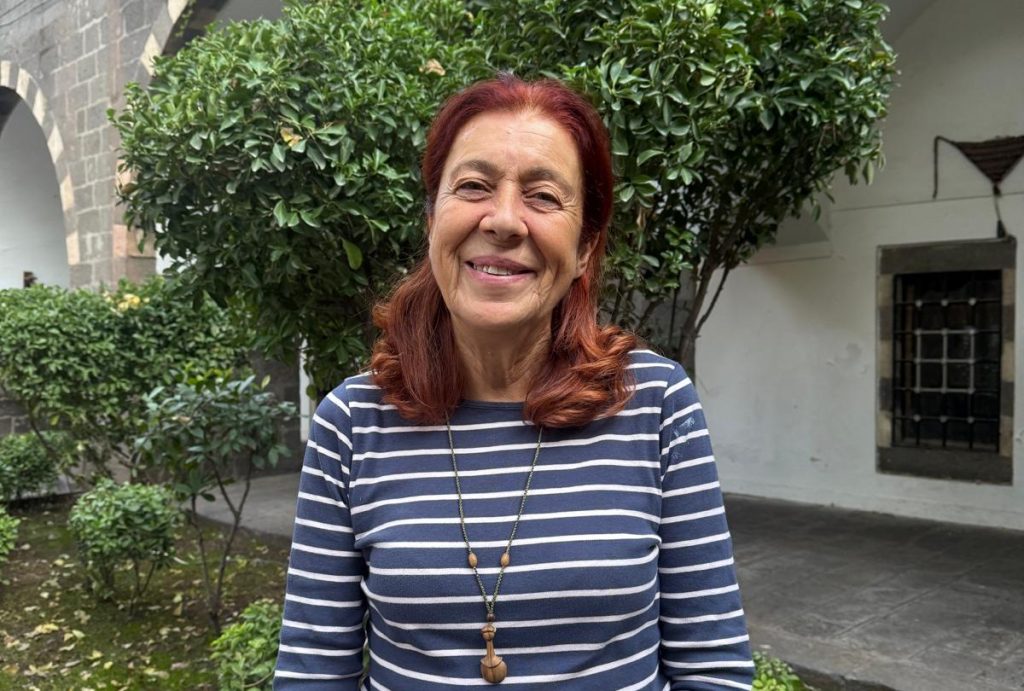
The 1992 Dublin Conference marked a turning point in this transformation. During the conference, the commodification of water—its integration into market conditions and its pricing—was legitimized. At the 1992 Rio Summit, the concept of ‘sustainable development’ became the political guideline for all nation-states. According to Üstün, the process initiated by these reports aimed not to solve the environmental crisis, but to resolve the crisis of capital.
From that point onward, the management of water ceased to be a public service of states and became an investment field for capital. Üstün noted that this created not only an economic but also a political form of domination: “The escalation of violence in Kurdistan is the result of the growing desire to intervene there. It has deepened inequality; while the people of the region were pushed into forced depopulation — a process of deliberate displacement—, capital rapidly settled into those territories. As oppression increased, inequality multiplied, interventions intensified, and those lands were seized for hegemonic interests.”
“The solution lies in civil organizations working based on the will of the peoples.”
Therefore, the solution is not possible merely through environmental policies; it requires political subjectivity. Üstün stated that the Forum participants took a stance in favor of building a peace that would liberate water, living spaces, and all beings: “The solution lies in civil organizations working based on the will of the peoples. The way to protect and transform life in the basin is through the collective will of the peoples on behalf of all living beings that inhabit it. Political grounds sustained by the will of the peoples will both transform the system and make peace permanent.”
The diplomacy of the people is rising
“We are not official actors, yet we can influence decisions. Diplomacy should no longer be the exclusive domain of states.”
Ismaeel Dawood, one of the founders of the Iraq-based organization Save the Tigris, took part in one of the most captivating sessions of the forum: People’s Water Diplomacy. Dawood proposed a new diplomatic language regarding the water crisis: “Governments have their negotiation tables, but now the people must have theirs as well.”
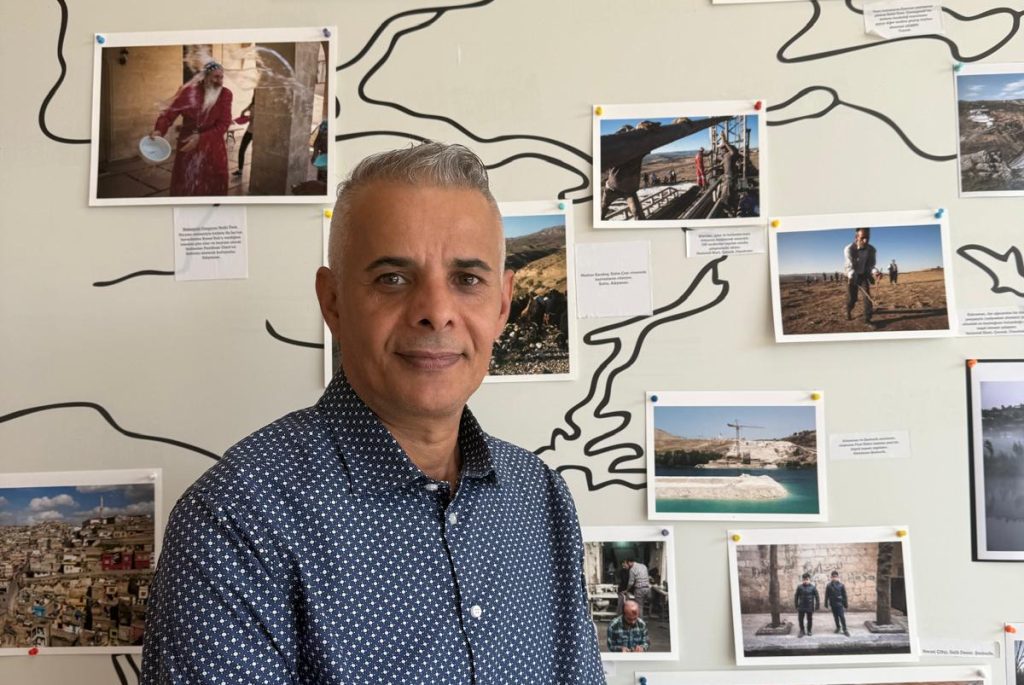
In the interview given to The Amargi, Dawood emphasized that it is possible to influence decisions through dialogue and interaction: “As a result of campaigns led by civil society in Iraq, the Mesopotamian Marshes were included in the UNESCO World Heritage List. In Italy, a public referendum prevented the privatization of water. These achievements were made possible through the advocacy of the people. We are not official actors, yet we can influence decisions. Diplomacy should no longer be the exclusive domain of states.”
The preparations for the Second Mesopotamia Water Forum Declaration aim to establish the diplomatic groundwork of civil society, inspired by the spirit of the Kathmandu Declaration.
From eco-genocide to life
One of the Forum’s most powerful conceptual frameworks was “ecology of peace”, a notion that defines peace not merely as the end of military violence but as the restoration of nature and society. Agit Özdemir of the MEM discussed this idea alongside the concept of “eco-genocide”: “If you cannot directly destroy a people, you destroy their living spaces. You take away their water, their soil, their forests. This is eco-genocide.”
Five thousand years ago, the Tigris and Euphrates brought agriculture, abundance, and settled life to Mesopotamia. Özdemir reminds us of this historical continuity: “The rivers were not only the waters of people and agriculture; they also enabled the multilingualism, multiculturalism, and shared life of this basin. The politicization of water, its militarization, and its subjugation to state power structures also threaten social memory and the peace between peoples.”
The Tigris and Euphrates are not international rivers but transboundary waters. This distinction creates a legal gap that favors Turkey.
The Tigris and Euphrates are not international rivers but transboundary waters. This distinction creates a legal gap that favors Turkey. Özdemir describes the situation thus: “Because the Tigris and Euphrates are not international rivers, there is no binding mechanism. Moreover, Turkey has not signed many agreements anyway.”
Living with water rather than managing it
Ecological justice was one of the concepts that came to the fore during the Forum’s final day. According to Özdemir, ecological justice means seeing water not as a commodity but as life itself. “We refuse to manage water. We seek to live in harmony with it”, says Özdemir.
This understanding of justice was concretized in the forum’s call for grassroots organizations. Participants proposed establishing water committees and water assemblies beginning in villages, which would then organize across countries to form a Mesopotamian Water Assembly. These structures would both raise awareness of local problems and serve as a common platform for regional peoples’ diplomacy. The goal is to break the nation-states’ monopoly on knowledge and to democratize information, data, and decision-making about water.
More than a forum
The second Mesopotamia Water Forum was not merely an environmental meeting but a platform where the political meaning of water was redefined. By reaffirming the people’s right to have a voice, it emphasized that water is not solely a matter of intergovernmental agreements but an entity that must be fought for in every aspect of life.
Although the final declaration of the forum has not yet been published, its framework is already clear: people’s diplomacy against the militarization of water, ecological justice against its commodification, and the free flow of water as the foundation of social peace.
Rengin Azizoğlu
Rengin Azizoğlu is journalist and news editor based in Istanbul.

